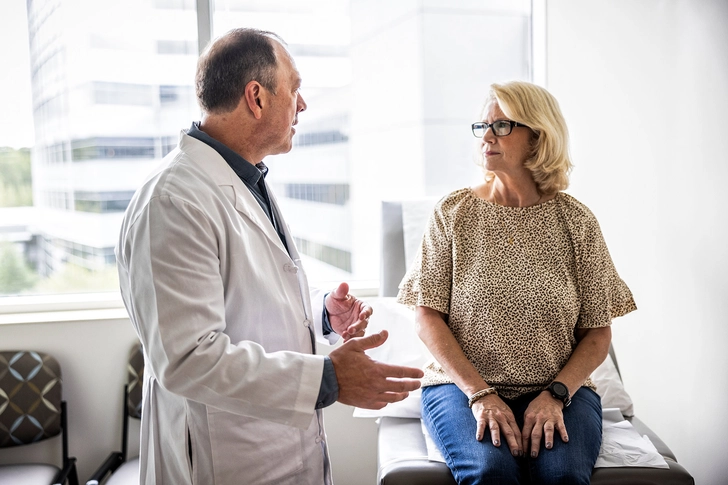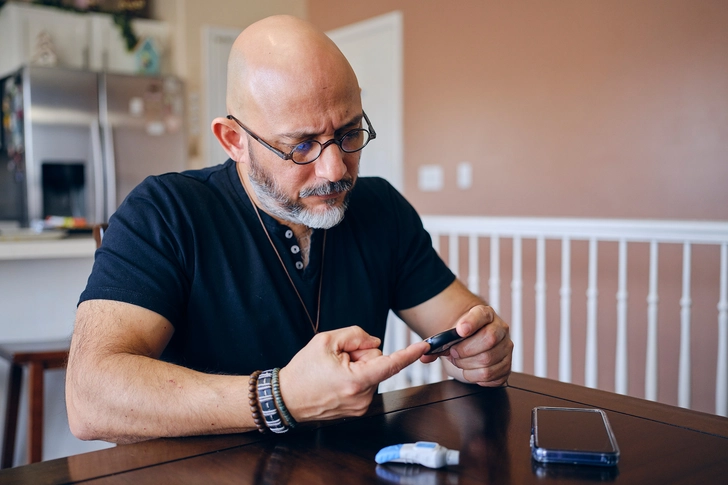- Overview
- Symptoms
- Causes & Risks
- Tests & Diagnosis
- Treatment
- Living With
- Complications
- Support & Resources
- Appointment Prep
- View Full Guide
Crohn's and Aging: What to Expect After 60



Managing Your Crohn’s Over Time
Whether you were first diagnosed with Crohn’s recently or have had it for decades, you might need to adjust how you manage your inflammatory bowel disease (IBD) as you get older. This is often because of other chronic conditions that might have developed, the drugs you take for them, and the normal changes the immune system goes through in later years. Still, you can get and keep Crohn’s under control and continue to live well, once you know what to be aware of and then take steps to protect yourself.

Will Crohn’s Get Better Or Worse With Age?
The one thing we know about Crohn’s is that it’s unpredictable. No matter your age, the goal is to keep it in remission and treat flares when they happen. But how you achieve that may change with age and because of your other health conditions. You may be at greater risk of side effects from some of your drugs, and past treatments may no longer work well for you. That’s why you’ll do better with personalized therapy, treatment that’s designed for your situation and closely monitored by your team to see if you’re getting the best response.

Keep an Eye On Your Bone Health
Crohn’s disease can make your intestines less able to absorb key nutrients, including vitamin D, so it poses a big risk to bone health. Over time, taking steroids to treat Crohn's disease coupled with not getting enough vitamin D can reduce bone mass. This can lead to osteoporosis, leaving bones weak and more likely to break. Low body weight and the loss of protective estrogen after menopause speeds up bone loss in women. Bone health can be monitored with X-rays called DEXA scans. Depending on the results, you might benefit from a bone-strengthening drug called a bisphosphonate.

Keeping Bones Healthy
Strength training boosts bones as well as muscles. It involves using weights for exercises that target all muscle groups, two or three times a week for about 45 minutes each session. Getting a plan from a fitness trainer will start you off safely and help you progress. Diet also plays a part: Eat calcium-rich and vitamin D-fortified foods. If you’re lactose intolerant, work with a dietitian to find alternatives to dairy, possibly through supplements. Not smoking or overindulging in alcohol are other important steps for bone health.

Malnutrition Can Sneak Up On You
Crohn’s symptoms can put you at risk of nutritional deficiencies at every age, but that risk increases as you age. You may have even less of an appetite or won't have the energy to cook nutritious meals. Diet restrictions, which aren’t always necessary, can keep you from getting key nutrients. Normal aging can add to the risk if you have a hard time chewing and shun food or if you’ve become isolated and have lost interest in food. Rapid weight loss, a lack of muscle tone, and fatigue from anemia are some of the signs.

Ways to Avoid Malnutrition
The standard advice to eat a balanced diet may not be enough. Ask your doctor to test you for specific deficiencies. Then work with a registered dietitian who can review your results. They can craft a personalized diet that delivers the right amount of protein and other nutrients. A simple breath test can see if you’re truly lactose intolerant so you’ll know whether you should eat lactose-free dairy and foods fortified with calcium. Iron, vitamin B12 and, when not in a flare, fiber are important, too. Make room for these essentials and don’t waste your appetite on highly processed foods.

Look Out for Drug Interactions
Developing chronic health conditions, like high blood pressure and high cholesterol, on top of Crohn’s is very common as you get older. When you take several drugs to manage each condition, your risk of side effects and the number of potential side effects go up. Also, there’s a chance that some of the drugs will react badly with each other. Your doctor may need to change your Crohn’s treatment plan to protect your overall health, especially if you have a serious problem like congestive heart failure.

How to Avoid Medication Interactions
Make sure each of your doctors knows what the others have prescribed. Also ask your pharmacist to look for potential interactions. Know the possible side effects of each drug and report them right away. If you’re overwhelmed by all your medications, ask your primary care doctor if there are any you don't need to take. If years have passed since they were prescribed, your conditions might have changed. Or new medications may have become available. You can do some legwork on your own with an app or website that offers a drug interaction checker.

Make Sure Your Meds Are on Track
Review your medications with your Crohn’s team and ask for a risk-benefit assessment. That’s a treatment review to make sure your Crohn’s plan is helping you and not harming you. Having other health conditions might make it unsafe to take certain immunomodulators and anti-TNF agents. They leave you open to infections in later years. You may need to reduce or go off steroids you might take for Crohn's. They've been linked to heart conditions and bone loss.

Protect Yourself From Infections
Immunosuppressants quiet the things that cause Crohn’s but make your body less able to fight off infections. If you do take these meds, take care to avoid infections. Handwashing for 20 seconds each time is key. When you aren’t near soap and water, use a hand sanitizer with 60% or more alcohol. Be careful with food prep to avoid cross-contamination. Stay away from people who are sick. And stay up to date on all recommended vaccines to prevent the flu and other viruses.

Is Surgery Still an Option for Crohn’s After 60?
Surgery to remove a damaged section of the colon isn’t out of the question when you’re older, and it can be an important part of your care plan. Age alone doesn’t make complications more likely. The risks may be greater if you have other serious health conditions or nutrition deficiencies. Talk to your doctor about complications like infection and serious bleeding. Before surgery, getting the best possible nutrition leads to better outcomes. After surgery, you might need medications to avoid blood clots, another risk.

Conditions More Common With Crohn’s as You Age
Be proactive about all of your health. Crohn’s plus normal aging raises your risk of age-related diseases like diabetes, heart disease, and dementia. You may need a different specialist to help you manage each condition. Good communication between all your doctors ensures that your care is coordinated and that treating one condition won’t harm another. Keep a file with all your records, from test results to medications, that you can go over with each member or each team.

Healthy Aging With Crohn’s: Nutrition and Hydration
Two of the healthiest steps you can take are eating a nutritious diet and staying well-hydrated. Getting key nutrients helps counter the normal loss of immune system function, which can be further altered by Crohn’s drugs. These include quality protein, healthy fats like omega-3s, and fiber when you’re not in a flare. Dehydration sets in faster when you’re older and worsens with diarrhea. It’s not easy to spot early on, so be proactive and drink lots of fluids, especially water.

Healthy Aging With Crohn’s: Stay Active
Exercise is often called free medicine for good reason. It boosts mental and physical well-being, protects your heart and bones, and allows you to keep moving as you age. Aim to get daily exercise. Your doctor can suggest types of exercise that match your abilities. Fine-tune a plan with a fitness trainer who can detail exercises to do at home during a flare, like walking and strength training.

Healthy Aging With Crohn’s: Preventive Care
Crohn’s increases the risk of colon cancer. Colonoscopies for early detection are vital. Ask your doctor how often you should get them. And ask if risks like anesthesia side effects and the chance of a perforation outweigh the benefits. Also screen for other diseases, like cancers and osteoporosis. Skin cancers are more common when you’re on Crohn’s drugs like immunosuppressants and thiopurines. Stay on top of regular blood tests and vaccines, and schedule routine dental cleanings and eye exams.

Healthy Aging With Crohn’s: Get Help for Common Issues
Bowel incontinence is very common with Crohn’s. Your doctors are experienced with helping people manage it, so there’s no reason to be shy or embarrassed about bringing it up. Having pain anywhere along your GI tract or in your joints? Ask if NSAIDs or other pain relievers are safe for you. And if fatigue and feeling weak are problems, discuss whether a more nutrient-rich diet will help.

How to Get Support
With so many parts to managing Crohn’s, it can be hard to do it all by yourself. Talk with your care team about medications, eating, and juggling appointments. Be open with loved ones about your needs and feelings. Join a support group to get tips. And don’t hesitate to seek therapy when living with Crohn’s gets you down. Having a large network of people in your corner will reinforce all your positive self-care efforts.
IMAGES PROVIDED BY:
1) iStock/Getty Images
2) E+/Getty Images
3) iStock/Getty Images
4) iStock/Getty Images
5) Moment/Getty Images
6) iStock/Getty Images
7) Image Source/Getty Images
8) DigitalVision/Getty Images
9) DigitalVision/Getty Images
10) DigitalVision/Getty Images
11) iStock/Getty Images
12) E+/Getty Images
13) E+/Getty Images
14) E+/Getty Images
15) iStock/Getty Images
16) iStock/Getty Images
17) E+/Getty Images
SOURCES:
IBD (Inflammatory Bowel Diseases): "Aging and IBD: A New Challenge for Clinicians and Researchers."
Crohn’s and Colitis Foundation: "Fact Sheet: Older Adults and IBD."
Science Progress: "Tailoring therapy to the individuals of Crohn's disease."
Crohn’s & Colitis UK: "Growing Older with Crohn’s or Colitis," "Bones," "Immunosuppressants for Crohn’s or Colitis: What you can do to reduce your risk of complications," "Health Maintenance Checklist."
UC Health: "What women need to know about strength training."
Gastroenterology & Endoscopy: "Advancements in malnutrition in elderly inflammatory bowel disease patients."
University of Virginia Health System: "Nutrition and Crohn’s Disease."
Gastroenterology: "AGA Clinical Practice Update on Management of Inflammatory Bowel Disease in Elderly Patients: Expert Review," "Risk of Melanoma and Nonmelanoma Skin Cancer Among Patients With Inflammatory Bowel Disease."
CDC: "Hand Hygiene Frequently Asked Questions."
Immunometabolism: "Aging immunity: unraveling the complex nexus of diet, gut microbiome, and immune function."
Crohn’s & Colitis Australia: "Exercise."
World Journal of Gastroenterology: "Preventive health measures in inflammatory bowel disease."